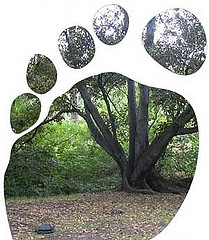
The Ecological Footprint concept, first introduced 15 years ago, provides an interesting way of looking at consumption. Consumption of the full range of bioresources - from grain, beef cattle, and fish, to peat and timber - is converted to a measure of the land and water surface area required to support that consumption, as well as disposal of wastes.
Not surprisingly, the Ecological Footprint of the United States, the highest consuming nation in the world, is larger than for any other nation. What is surprising is that the U.S. footprint is double that of the E.U. and far higher than a number of nations that consistently rank higher or comparable to the U.S. in quality of life indices.
Examination of biocapacity on a national basis shows that many of the most affluent countries, such as the United States, are consuming bioresources at levels beyond long-term replenishment capacity, and impacting far greater geographic areas than defined by national borders and coastal seas. Largely as a result of the practices of these relatively few countries, the global Ecological Footprint is estimated to now exceed the long-term carrying capacity of the earth.
Such estimates raise a question as to what responsibility high-consuming nations have to reduce the impacts of their consumption. Critical thinking about this issue inevitably leads to consideration of not only bioresource consumption, but consumption of non-renewable resources as well, and paints a sobering picture of our national profile.
The report by Dovetail Partners Inc. can be found at www.dovetailinc.org.
Dr. Jim Bowyer is professor emeritus, University of Minnesota Department of Bioproducts and Biosystems Engineering. He is also an Elected Fellow of the International Academy of Wood Science; President of Bowyer and Associates, Inc., a wood science and bioenergy consulting firm; member of the Governance Board and Chairman of the Scientific Advisory Board of the Temperate Forest Foundation (Portland, Oregon); and a Member of the Blandin Foundation Vital Forests/Vital Communities Board of Advisors. He has served as President of the Forest Products Society and Society of Wood Science and Technology, Vice President of the Consortium for Research on Renewable Industrial Materials, and Chairman of the Tropical Forest Foundation.
Dovetail Partners Inc. is a nonprofit organization that provides authoritative information about the impacts and trade-offs of environmental decisions, including consumption choices, land use, and policy alternatives. This article was reprinted with permission. The opinions expressed in this article are solely those of the author and are not necessarily those of GREENandSAVE.

